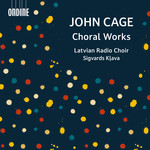
Cage: Choral Works
 $35.00
Out of Stock
$35.00
Out of Stock6+ weeks add to cart
JOHN CAGE
Cage: Choral Works
Latvian Radio Choir, Sigvards Klava (conductor)
[ Ondine / CD ]
Release Date: Friday 19 August 2022
This item is currently out of stock. It may take 6 or more weeks to obtain from when you place your order as this is a specialist product.
This new album release by the Latvian Radio Choir and conductor Sigvards Klava on Ondine is devoted to choral works by the legendary American composer and music pioneer John Cage (1912-1992), one of the most leading figures in 20th Century music.
John Cage is the dictionary definition of an avant-garde composer. Choral music and John Cage might seem like an odd pairing. And indeed, strictly speaking, Cage wrote only two compositions for chorus, both of which appear on this album: Hymns and Variations (1979) and Four2 (1990). The other works on the album are written for ensembles that are more or less open-ended and which have been interpreted here for choral forces. One reason Cage and choruses did not mix well may have been his notorious hostility to harmony in music. Arnold Schoenberg told Cage that he lacked any feeling for harmony, and that this would be a wall between him and his goal of being a composer. Given all this, it is no wonder that Cage and choruses didn't tend to mingle together. And so it was not until Cage was 67 years old that he wrote his first work for choral forces: Hymns and Variations.
The two Hymns in Hymns and Variations are literally that: two four-part pieces by the early American composer William Billings, from his collection The New-England Psalm-Singer (1770). Cage took these two pieces ("Old North" and "Heath") and applied a method of subtraction and extension to create both the Hymns and the variations. A decade later, Cage started a series of works known as his "number pieces". These pieces all feature simple materials (mostly single notes) whose timing and duration are unpredictable within broad limits defined by "time brackets." They range from solos (the One series) to full orchestra (Sixty-eight, Eighty, 103, etc.). They represent a surge of creativity in the last two years of Cage's life; he saw them as a really new direction in his music and was quite excited to work on them. Three of them are heard on this album: Five (1990), Four2 (1990), and Four6 (1992). Even though composed using broadly similar methods, the number pieces have individual voices and styles. Four2 was written for a high school choir (the text is drawn from the letters in the name of the school's home state: "Oregon"). Written with a chorus in mind, it connects most directly to that tradition. The other two number pieces here do not specify ensembles, but are suitable for voices. Five was one of the very first of the number pieces. The five parts have particular pitch ranges (mostly on the higher side) and any voices or instruments that can play the pitches can play the piece. Four6 goes further still. Here, even within the individual parts the choice of specific sounds is left to the performer. Each musician is instructed to select twelve sounds that can be extended in time in a static way. The score then references these by number and places them within the time brackets. So when we hear Four6, we are hearing sounds chosen by the performers that are arranged in the flexible architecture of time composed by Cage. Cage viewed these pieces as a turning in his music at long last towards harmony: "I'm surprised at almost all the ideas that come to my head," he said in an interview in 1990, "because they have to do with harmony."
BBC Music Magazine Award Nomination 2023 - Choral
"you can't but be stunned by the fearless skill of Sigvards Klava's choir as they navigate the most jagged, fragmented notes and pitches - the musical equivalent of climbing Mount Everest just with your hands and feet" BBC Music
"The performers are expected to follow certain rules or guidelines, and Cage offers a pronunciation guide, but there's still considerable freedom in performance and here the choir sounds more assured and committed." Choir & Organ
"one is unsurprised by the unconventionality but taken aback by the richness and variety of the final musical result. It must be said as well that the singers sound as though they are enjoying themselves enormously." Gramophone Award WINNER 2023 - Choral
Tracks:
Five
Hymns and Variations
Four2
Four6

